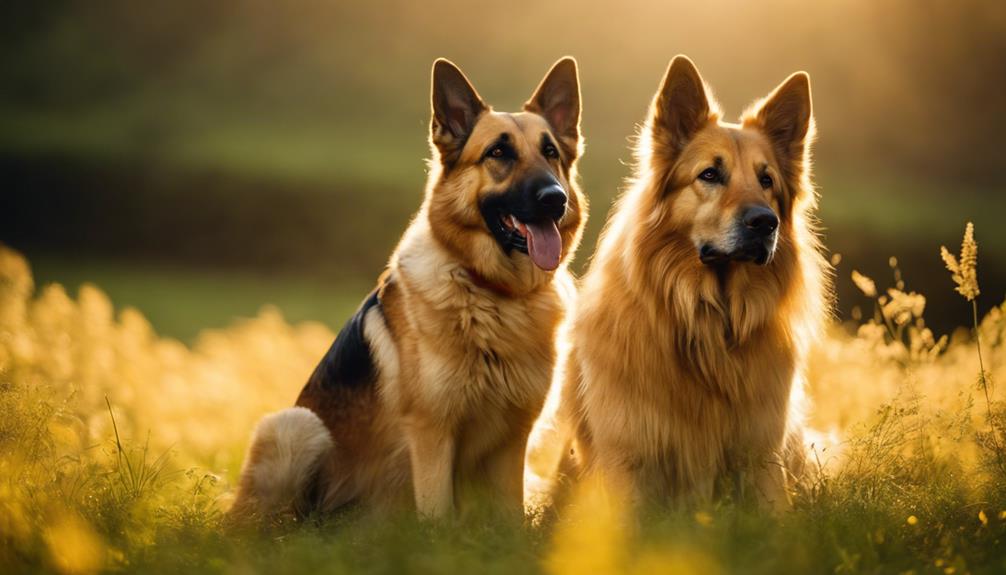Golden Shepherd: Breed Information and Characteristics
The Golden Shepherd is a crossbreed that combines the best traits of the Golden Retriever and the German Shepherd. This mix results in a dog known for its smartness, loyalty, and a protective attitude. Typically, they weigh between 60 to 100 pounds and have a height of 22 to 26 inches, making them a medium to large-sized dog. Their coats can vary widely in color, including shades like sable, cream, and black.
These dogs are loved for their friendly nature, strong protective instincts, and desire for companionship, making them perfect for families. However, they can be prone to health issues such as hip dysplasia. With proper care, including regular vet visits and a healthy diet, many of these concerns can be managed.
Golden Shepherds thrive in active homes where they can receive plenty of exercises, training, and socialization, showcasing their versatility and easygoing personality.
Key Takeaways
- Golden Shepherds are smart and loyal, bred from two popular dogs.
- They need regular exercise and grooming due to shedding.
- Watch for health issues like hip dysplasia and bloat.
Quick Facts
Golden Shepherds are a mixed breed from Golden Retrievers and German Shepherds. They’re not officially recognized by the big dog clubs but they grab attention with their mix of looks and behaviors from their parent breeds. These dogs are big, weighing 60-100 lbs, and have a height of 22-26 inches. Their coat can be sable, cream, gray, black, or white, making them quite the head-turners.
They’re surprisingly good at adapting to different living situations, including apartments, as long as they get enough exercise and things to keep their brains busy. Golden Shepherds are also pretty easy to train, which is great news for first-time dog owners. However, training is key to make sure they behave well indoors and use their smarts in ways that make everyone happy. They usually live for 10-12 years, so starting training early helps them become well-behaved members of the family.
Overview

The Golden Shepherd stands out as a unique mixed breed, born from the combination of German Shepherd and Golden Retriever parents. This breed inherits a medium to large frame, showcasing the strength of its parentage. With a double coat that ranges from short to long, they require regular grooming to keep their coat healthy and manage shedding.
Golden Shepherds are known for their robust health, typically living between 10-14 years. However, they can be prone to hip dysplasia, a condition common in both parent breeds. This highlights the need for frequent vet visits and an active lifestyle that promotes both physical and mental well-being.
Grooming is essential for their care, involving regular brushing and the occasional bath to ensure their coat stays in top condition and to check for any health issues, securing a contented life for this smart and faithful mixed breed.
Intelligent and Loyal Companions
Golden Shepherds stand out due to their intelligent and loyal nature, traits they inherit from their German Shepherd and Golden Retriever parents. These qualities make them exceptional family pets and reliable friends. They quickly learn new commands and eagerly aim to please, which makes teaching them a smooth and enjoyable process.
These dogs deeply value companionship and create close, loving relationships with their owners. Their loyalty is remarkable, often showing through their protective behavior towards their families.
Golden Shepherds shine when given tasks that challenge their minds and require them to solve problems. This not only keeps them mentally stimulated but also reinforces their role as smart and faithful companions. Their friendly disposition makes them wonderful pets, always ready for cuddles and interaction.
Here’s a simplified breakdown of what makes Golden Shepherds so special:
| Trait | Description | Benefit |
|---|---|---|
| Intelligence | Quick learners | Makes teaching them a breeze |
| Loyalty | Deep commitment to their families | Acts as both friend and guardian |
| Companionship | Loves being around people | Helps combat loneliness |
| Problem-solving | Enjoys challenges | Stays content and mentally sharp |
| Affection | Forms strong bonds with humans | Offers comfort and emotional support |
In essence, Golden Shepherds are more than just pets; they’re smart, faithful friends that bring joy and companionship to our lives.
Breed Origin Details

The Golden Shepherd is a blend between a Golden Retriever and a German Shepherd, marking a notable moment in the creation of designer dogs. This breed combines the best of both worlds, coming from two highly respected breeds. This mix provides a deep dive into the genetic heritage and the intentional design of dog traits for certain benefits. As we examine the breed’s origins, we’ll look at the perfect mix of history and the distinctive characteristics that make this hybrid special.
Genetic Background
The Golden Shepherd comes from a rich genetic background. It inherits its traits from the Golden Retriever and the German Shepherd, both known for their intelligence, loyalty, and versatility. This mix aims to produce a dog with a balanced temperament, suitable for families, work, or companionship.
Historical Roots
The historical roots of the Golden Shepherd trace back to an interest in combining the best features of two popular breeds. Breeders wanted to create a dog that could excel in various roles, from assistance and service to family pets. This interest has led to the Golden Shepherd, a dog admired for its adaptability and charm.
Distinctive Features
The distinctive features of the Golden Shepherd include its intelligence, friendly nature, and protective instincts. These dogs inherit the Golden Retriever’s love for people and the German Shepherd’s alertness, making them excellent companions. They often have a mix of physical traits from both parent breeds, including the coat color and build, which adds to their appeal.
Genetic Ancestry
Golden Shepherds are a unique blend of two prominent dog breeds: Golden Retrievers and German Shepherds. This hybrid comes from the crossing of a Golden Retriever and a German Shepherd, showcasing a rich heritage from Germany and Scotland. These dogs are known for combining the best traits of their parent breeds. They have the protective instincts of German Shepherds and the friendly, gentle nature of Golden Retrievers.
In 2009, the International Designer Canine Registry recognized the Golden Shepherd. This acknowledgment highlights the breed’s versatile abilities and the careful planning that went into their development. Golden Shepherds stand out for their ability to adapt to various situations, making them excellent companions and family pets. Their genetic background is not just a testament to their abilities but also to the thoughtful efforts to create such a remarkable breed.
Historical Development
Exploring the history of the Golden Shepherd takes us back to its inception in 2009. This breed was intentionally created by combining the best traits of two beloved breeds: the Golden Retriever and the German Shepherd. Although the American Kennel Club (AKC) does not officially recognize it, other kennel clubs have given it a nod. The Golden Shepherd is a testament to the thoughtful combination of its parent breeds’ qualities.
The Golden Retriever, hailing from Scotland, and the German Shepherd, which gained popularity post-World War One, both bring unique attributes to the Golden Shepherd. Recognized as a mixed breed by the International Designer Canine Registry, the Golden Shepherd showcases the intelligence of the German Shepherd and the friendliness of the Golden Retriever. This mix not only highlights the advantages of crossbreeding but also the breed’s versatile nature in various settings.
Notable Traits
Golden Shepherds are a modern mix of two traditional breeds, the Golden Retriever and the German Shepherd, creating a dog that excels in versatility and adaptability. These dogs combine the best traits of their parents, resulting in a breed known for its smartness, devotion, and warm nature. Since their appearance in 2009, Golden Shepherds have charmed many with their combination of the German Shepherd’s sharp intellect and strong sense of duty alongside the Golden Retriever’s sociable and eager-to-please attitude.
Although they’re not officially recognized by the major dog breed organizations, their appeal lies in the perfect balance of temperament and the variety in appearance, showcasing a range of colors and patterns inherited from their lineage. They’re perfect for energetic households, offering unwavering companionship and a love for play. Their loyalty and playful spirit make them more than just pets; they become a devoted part of the family.
Medium to Large Breed

Exploring the Golden Shepherd, we see the importance of their medium to large size. This characteristic not only defines their physical appearance but also determines the type of home and care they need to flourish.
We will now discuss essential aspects of their care and management.
- Breed Size Overview: Understanding how their size impacts their health is critical. We’ll look at both the physical and mental aspects.
- Ideal Living Spaces: Creating the right environment for their active and large nature is key. This means plenty of space for them to move and play.
- Activity Level Needs: Finding ways to satisfy their need for exercise and mental stimulation is crucial for their well-being.
Understanding the Golden Shepherd’s size helps us see how it affects their health and happiness. Homes that provide enough space and an active lifestyle are best for them. Engaging them physically and mentally will ensure they lead a balanced and fulfilled life.
Breed Size Overview
Golden Shepherds are a blend of German Shepherd and Golden Retriever, making them a medium to large dog breed. They stand at about 22-26 inches tall and weigh between 50-90 pounds, showcasing a strong physique perfect for those with an active lifestyle. This hybrid inherits the best qualities from both parents, including their size.
These dogs have a double coat that may be medium to long, which keeps them warm and requires regular grooming to stay healthy. Because of their energy and size, Golden Shepherds need plenty of exercise and do best with access to a yard or large outdoor space. It’s crucial for owners to keep up with their physical needs to ensure a fulfilling life for these devoted pets.
Ideal Living Spaces
Golden Shepherds thrive in environments that offer them plenty of room. Their mix of German Shepherd and Golden Retriever genes means they’re not great for small apartments.
These dogs need houses with big yards for their health and happiness, where they can run, play, and join in on family fun. They’re perfect for active people who want a loyal friend to share in their daily lives.
Activity Level Needs
Golden Shepherds need a lot of exercise to stay healthy and happy. This mix of Golden Retriever and German Shepherd should get around an hour of exercise every day. They love activities like walking, running, and exploring nature trails. These not only keep them physically fit but also help keep their minds sharp.
Playing interactive games and involving them in fun activities can prevent them from getting bored and acting out. Training sessions are also great for their brain health, making sure they’re both physically and mentally in top shape.
Golden Shepherds do best in homes with space to move around, as they love being outdoors. This matches their high energy levels and helps them lead a balanced life.
Common Health Concerns
For Golden Shepherds, regular exercise is crucial to their health. However, it’s just as important to be aware of their risk for certain health issues like bloat, hip dysplasia, and degenerative myelopathy. It’s wise to choose a breeder who screens their dogs for these conditions to lower the chances of your pet inheriting them.
Regular visits to the vet can catch these problems early, which is key to managing them effectively.
A balanced diet and the right amount of exercise can help reduce the impact of these health problems. Keeping an eye on your dog’s diet and health will help your Golden Shepherd enjoy a healthy and happy life.
Training and Socialization
Training and socialization are crucial for Golden Shepherds. Their sharp minds and friendly nature mean they do well with training that rewards them, keeping them interested and eager to please. It’s important to start socializing them early. This helps them get along with people and other animals and prevents behaviors like chasing.
Golden Shepherds are adaptable and easygoing, making them a great pick for those new to dog ownership. They love meeting new people and animals. Starting training and socialization young helps them grow into friendly, obedient dogs.
Friendly and Protective Nature

Golden Shepherds are known for their friendly and protective nature, which makes them excellent companions for both individuals and families. They perfectly blend their love for humans with a strong sense of duty, serving well in roles from beloved family pets to therapy or service dogs. It’s crucial to understand their behavior and how to support their natural traits for a happy life together.
Protective Traits: Golden Shepherds have a natural instinct to protect, which shows up in various ways depending on the situation. Whether it’s guarding their home or being cautious around strangers, understanding and training these instincts is key.
Family-Friendly: Their loyalty and affectionate nature make Golden Shepherds ideal pets for families. They are great with kids and adapt well to family life, providing both companionship and security.
Social Skills: Starting socialization early is essential for Golden Shepherds. It helps them get along with other pets and people, ensuring they grow into well-adjusted adults.
Traits of Protection
Golden Shepherds strike the perfect balance between being affectionate companions and vigilant guardians for their families. These dogs are incredibly loyal, quickly becoming an integral part of their home through their deep connections with their owners. They show their love in ways that make their protective nature clear, but without resorting to aggression. This reflects their smart and thoughtful nature.
They are born with an instinct to watch over their home, always alert and ready to protect their loved ones if necessary. Training and socialization play a crucial role in making sure Golden Shepherds stay friendly and effective protectors. This ensures they can be sociable while still guarding their families.
Family Compatibility
Golden Shepherds are known for their friendly and protective nature, making them great family pets. They form strong bonds with family members, ensuring they’re always on the lookout to keep everyone safe. Their smarts mean they’re not just good at keeping watch; they can also tune into what each family member needs, making them incredibly adaptable. Plus, they’re gentle with kids, helping to create a safe space for them to grow and play.
These dogs get along well with other pets too, making them perfect for a home with a mix of animals. This ability to live peacefully with other pets helps to build a loving and secure environment that’s great for family bonding and overall happiness.
Socialization Needs
Golden Shepherds are friendly and protective dogs that need to be well-socialized from when they are puppies. This helps them become well-behaved around people and other animals. Their natural instinct to protect and their love for companionship make them great pets. However, if they’re not properly introduced to different situations early on, they might become too cautious around strangers, overshadowing their friendly nature.
Introducing them to various settings, different people, and animals from a young age is key to developing their friendly personality. At the same time, it ensures their protective nature doesn’t become aggressive. Including them in family activities strengthens their bond with every member of the household. It also plays a significant role in their social development, maintaining their amiable character.
Proper socialization is crucial for these dogs. It helps them understand the difference between everyday interactions and actual threats. This allows their protective instincts and sociable traits to work together harmoniously.
Guarding Behaviors
Golden Shepherds blend protectiveness and friendliness due to their heritage, combining qualities from the German Shepherd and Golden Retriever. These dogs are loyal, alert, and highly intelligent, making them perfect for families.
They excel in environments where they can be both companions and protectors. Training and socialization are key to ensuring their guarding instincts are positive, keeping them friendly and well-behaved.
Affection Level
Golden Shepherds shine in their role as family dogs, thanks to their mix of friendliness and protective instincts. They show deep affection for their families, often through physical closeness like cuddling and giving kisses. These dogs are loyal companions, always ready to protect their loved ones, making them excellent guard dogs.
Their love for family is evident in how they interact with children, showing patience and a gentle nature. Golden Shepherds thrive in a nurturing environment, becoming integral parts of the household. Their combination of a welcoming attitude and a desire to protect makes them more than just pets; they’re cherished family members.
Golden Shepherds stand out as ideal choices for anyone wanting a dog that is both loving and vigilant. They bring joy and security to their homes, making life with them both rewarding and fun.
Common Ailments

Owning a Golden Shepherd means being on the lookout for health problems that can affect them, from genetic disorders to ongoing illnesses. Catching these health issues early and taking steps to prevent them can really help your dog live a happier life. It’s important to tackle long-term health problems by working closely with your vet and following a plan that’s right for your dog.
Spotting Health Problems
Look out for signs of illness in your Golden Shepherd and get them checked by a vet quickly. This early action can make a big difference.
Preventive Care
Regular check-ups and vaccinations are key to keeping your dog healthy. It’s also smart to keep them on a good diet and make sure they get plenty of exercise.
Handling Ongoing Health Issues
If your Golden Shepherd has a chronic condition, consistent care is crucial. This includes regular vet visits and following a care plan that’s tailored to their needs.
Identifying Health Issues
Being aware of common health problems like bloat, hip dysplasia, and degenerative myelopathy is crucial for Golden Shepherds. These conditions are seen in their parent breeds, the German Shepherd and Golden Retriever, and knowing about them can help keep your dog healthy. Bloat is a critical condition where the dog’s stomach fills with gas and twists. It needs immediate vet care to avoid serious harm. Hip dysplasia is when the hip joint doesn’t form right, causing pain and movement problems as the dog gets older. Catching these issues early through regular vet visits can help manage them better.
Choosing puppies from trusted breeders who focus on health can lower the chances of your dog having these problems. A balanced diet, regular exercise, and good grooming practices play a key role in keeping Golden Shepherds happy and healthy. This approach ensures they lead a fulfilling life while minimizing the risk of severe health issues.
Preventative Care Strategies
To ensure the health and well-being of Golden Shepherds, it’s vital to adopt comprehensive care routines, particularly to prevent conditions like bloat, hip dysplasia, and degenerative myelopathy. Regular visits to the vet are key for catching and managing these issues early on. Feeding them diets designed for large breeds can help prevent bloat. It’s also important to choose breeders who prioritize health screenings, as this can help prevent genetic diseases.
Screening for health issues early and maintaining a proper exercise plan can mitigate hip dysplasia. These actions are not just beneficial; they’re necessary for keeping Golden Shepherds healthy and active throughout their lives.
Managing Chronic Conditions
Managing health issues in Golden Shepherds involves a comprehensive health care strategy. This includes regular visits to the vet, a diet tailored to their needs, and an exercise plan that suits their condition. Golden Shepherds are prone to health problems like hip dysplasia, bloat, and degenerative myelopathy. Catching these issues early through regular veterinary check-ups is key to managing them effectively. Choosing a Golden Shepherd from a trusted breeder can also reduce the chances of these conditions.
Creating a care plan that includes the right food and physical activity is crucial for improving the life quality of Golden Shepherds with chronic health issues. Proper nutrition and grooming are important for keeping these dogs healthy and comfortable.
Grooming and Exercise Needs

Keeping a Golden Shepherd healthy and happy is all about the right mix of grooming and exercise. These dogs thrive with regular grooming and activities that match their high energy. We’ll go through the basics of grooming, how to take care of their coat, and the best ways to keep them active and engaged.
Grooming Basics
Coat Care
Matching Their Energy
Golden Shepherds need consistent grooming and plenty of exercises. A simple grooming routine keeps their coat in good condition, and activities that suit their energy level keep them fit. Let’s break down how to maintain their coat and ensure they get enough physical activity.
Grooming Basics
Regular brushing is crucial for keeping their coat shiny and healthy. It also helps to reduce shedding and prevents mats. Bathing them every few months, or as needed, keeps their skin clean and healthy. Don’t forget about nail trimming and ear cleaning to prevent infections.
Coat Care
Golden Shepherds have a thick coat that needs special attention. Use a brush designed for their specific coat type to effectively remove loose hair and prevent tangling. Incorporating a de-shedding tool during shedding season can significantly reduce hair buildup at home.
Matching Their Energy
These dogs are full of energy and require daily exercise to stay happy. Mixing up their routine with walks, runs, and playtime in a fenced yard or park keeps them physically and mentally stimulated. For an extra challenge, try agility training or dock diving to tap into their natural abilities.
Grooming Routine Essentials
Golden Shepherds, a mix between German Shepherds and Golden Retrievers, have a thick coat that sheds often. To keep their fur in top shape and minimize shedding, it’s crucial to brush them 2-3 times a week. This regular grooming isn’t just about keeping your home hair-free; it’s also a chance to spot any ear infections early, making sure their ears are clean and healthy.
Including dental care in their grooming routine is key for their overall health. This can prevent dental issues that could affect their well-being. Taking the time to care for your Golden Shepherd’s coat, ears, and teeth not only keeps them looking good but also strengthens the bond you share. It shows your pet you care, contributing significantly to their happiness and health.
Exercise Regimen Overview
Ensuring a Golden Shepherd stays healthy and happy means making sure they get plenty of exercise, about 60 minutes daily. This active breed loves to engage in activities like running, hiking, and playing fetch. These activities are not just good for their body but also keep their mind sharp.
Brushing their coat a couple of times each week is also crucial. It helps with shedding and strengthens the bond between you and your dog.
Exercise and mental challenges can keep them from feeling anxious or becoming destructive. Adding interactive games and regular training to their daily activities can cover all bases for their care. This approach takes care of both their physical and mental needs in a balanced way.
Coat Care Techniques
Taking care of a Golden Shepherd’s coat is crucial for their overall health and happiness. Along with their need for regular exercise, keeping their double coat free from mats and managing shedding is key. Brushing them thoroughly 2-3 times a week is a must. This not only keeps their coat in top condition but also reduces the hair scattered around your home.
Incorporating grooming with daily activities like walks and play ensures they are not only physically active but mentally stimulated as well. A balanced mix of physical activities and grooming addresses their needs fully, making for a content and well-behaved companion. This approach helps prevent boredom and any unwanted behaviors by fulfilling their comprehensive exercise and mental stimulation needs.
Activity Level Matching
Golden Shepherds need to stay active and well-groomed to be happy and healthy. These dogs should get around 60 minutes of exercise every day. This keeps them fit and prevents them from becoming bored or destructive. Their coats, which shed year-round and more so during seasonal shifts, demand regular care. Brushing them 2-3 times a week helps control shedding and keeps their coat in good condition.
To meet their needs, it’s not just about physical activity. Mental stimulation plays a key role too. Owners should mix things up with games, walks, and interactive activities. This approach ensures the dog’s mind and body are both engaged, promoting overall health.
Brushing and Bathing Tips
Regular grooming is key for keeping Golden Shepherds looking their best and staying healthy. These active dogs with their thick coats need to be brushed 2-3 times a week to avoid tangles and keep their fur in good condition. This routine also helps manage their shedding, which increases with the changing seasons.
Golden Shepherds should be bathed once a month or more often if they get dirty from their adventures. Always use shampoos made for pets to avoid irritating their skin. It’s also crucial to keep an eye on their ears, cleaning them when needed to prevent infections.
Following these grooming steps not only keeps shedding under control but also ensures that Golden Shepherds remain healthy and look great, making them even more enjoyable as pets.
Dietary Requirements

Understanding the nutritional needs of Golden Shepherds is key to their health and happiness. Crafting a diet that supports their energy and well-being helps prevent breed-specific health issues. It’s essential to focus on balanced nutrition, be mindful of their dietary restrictions, and stick to a consistent feeding routine.
A balanced diet for a Golden Shepherd should include high-quality proteins, healthy fats, carbohydrates, vitamins, and minerals. This mix ensures they get the energy they need for their active lives and supports their overall health. It’s also crucial to adjust their diet based on their age, activity level, and any health concerns.
Regarding dietary restrictions, some Golden Shepherds may have sensitivities to certain foods. Paying attention to how your dog responds to different ingredients can help you tailor their diet more effectively. Regular vet check-ups can aid in identifying any dietary needs or restrictions.
Sticking to a regular feeding schedule helps maintain their digestive health and keeps their energy levels stable throughout the day. It also helps in managing their weight, which is important for preventing joint problems and other health issues common to the breed.
Balanced Nutrition Essentials
Golden Shepherds, a blend of German Shepherd and Golden Retriever genes, are large, energetic dogs that thrive on a balanced diet. They need 3-4 cups of premium dog food made specifically for large breeds every day. This diet helps prevent health issues like bloat and supports their high energy needs, muscle growth, and immune system.
Given their active nature, inherited from both parent breeds, it’s vital to feed them properly. Nutrition plays a key role in keeping them healthy, avoiding digestive problems, and maintaining a healthy weight. A diet rich in essential nutrients ensures these affectionate and faithful pets live a long, vibrant life.
Common Dietary Restrictions
Golden Shepherds, like many large dog breeds, often have health issues including bloat, hip dysplasia, and allergies. These conditions make it crucial to feed them a diet that’s well-balanced and designed for their specific needs. High-quality dog food that’s rich in protein and fiber is key to helping them avoid digestive problems and stay healthy.
In addition to choosing the right food, it’s also important to manage how much and how often Golden Shepherds eat. Proper portion control and a consistent feeding schedule can help prevent obesity. This is especially important for Golden Shepherds, as carrying extra weight can make their health issues worse.
Because every Golden Shepherd is unique, getting advice from a veterinarian is a smart move. They can help craft a diet plan that takes into account any specific health concerns or dietary restrictions your dog might have.
Feeding Schedule Importance
A well-planned feeding schedule is crucial for the health and longevity of Golden Shepherds. These dogs thrive on 3-4 cups of high-quality dog food designed for large breeds each day. Sticking to this amount helps prevent bloat and keeps them in top health. Choosing the right dog food is vital as it meets their nutritional needs and supports their overall health and longevity.
Consistent feeding times and balanced meals play a major role in avoiding obesity and related health problems in Golden Shepherds. Adjusting their food intake based on how active they are ensures they stay healthy. So, it’s clear that a regular feeding schedule and the right diet are key for the wellbeing of these dogs, highlighting the importance of proper dietary management.
Frequently Asked Questions
Is a Golden Shepherd a Good Family Dog?
- Golden Shepherds excel as family pets due to their smart and loyal nature.
- They are great with kids and need a moderate amount of exercise.
- These dogs tend to be healthy, making them reliable companions.
Are Golden Shepherds Rare?
- Golden Shepherds are somewhat common, not very rare.
- Breeding them involves specific challenges and health considerations.
- Adoption provides homes for these mixed-breed dogs.
Are Golden Shepherds Easy to Train?
- Golden Shepherds excel in training with positive feedback.
- Early socialization is key to avoid behavioral problems.
- Teaching a variety of commands enhances their skills.
Can German Shepherds Be Golden?
- Purebred German Shepherds usually have specific coat colors.
- Golden hues are rare and might indicate health issues.
- Stick to breed standards for fewer health concerns.

